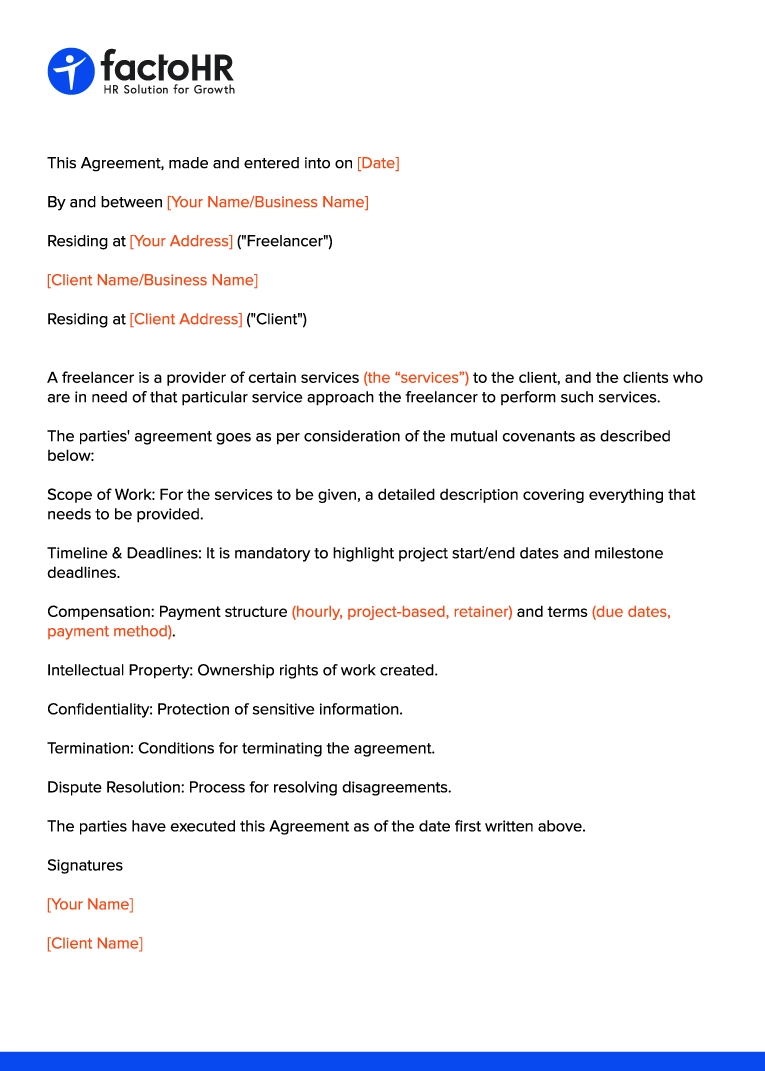Best Free Contract Template for Freelancers

Download a free freelance contract template in PDF or Word
Table of Contents
Establishing an effective freelance agreement is one of the most vital steps in creating a successful relationship with an independent contractor. You can be an experienced specialist or have just begun to establish your freelancing business; a complete freelance contract template can help defend your interests and build your clients’ confidence.
What is a Freelance Agreement?
A freelance contract is a legal document that outlines the working relationship between a freelancer and a client. This contract serves as the foundation of your collaboration, detailing the scope of work and payment conditions.
Freelance contracts differ from traditional employment relationships by offering more flexibility for independent contractors. This allows freelancers to work according to their own terms while ensuring that both parties clearly understand their obligations.
Having a well-designed freelance agreement is essential to avoid issues such as scope creep, delayed payments, and misunderstandings that can disrupt a project.
In the context of India’s growing gig economy, a properly structured freelancer agreement has become crucial. It helps maintain professional standards and adhere to legal regulations.

Simple Freelance Contract Format

Get Free Sample of Freelancer Contract Template
The following is a simple template of a freelancer contract in India:
Project: [Insert Project Name]
Date: [Insert Date]
Parties: [Freelancer Legal Name, Address] and [Client Legal Name, Address]
Scope of Services
Services: [Detailed description of tasks and deliverables, inclusions, exclusions]
Revisions: [e.g., two rounds within 7 days; additional billed at ₹X/hour]
Acceptance: [Objective criteria; deemed acceptance after five business days without feedback]
Timeline and Milestones
Start Date: [Date]
Milestones: [List with dates and deliverables]
Completion Date: [Date]
Dependencies: [Client inputs and stop-clock clause]
Compensation and Payment
Total Fee or Rate: [₹ Amount or hourly/day rate]
Payment Schedule: [Advance %, milestone payments, final payment]
Invoicing & Due Date: [e.g., Net 7]
Late Fee: [e.g., 1.5% per month or ₹X flat]
Taxes: [GST applicability, GSTIN]
Expenses: [Pre-approved reimbursables]
Intellectual Property
Transfer: [On full and final payment, IP transfers to Client]
Freelancer Tools/Pre-existing IP: [Licensed, not assigned]
Moral Rights/Attribution: [Terms as agreed]
Confidentiality and Data Protection
Confidential Info: [Definition, permitted use, term]
Data Processing: [Roles, security, breach notice, deletion]
Independent Contractor Status
No employment, benefits, or exclusivity inferred.
Warranties and Liability
Freelancer warrants originality; client warrants provided materials.
Liability cap: [Fees paid under this agreement].
Exclusion: No indirect/consequential damages.
Termination
For convenience: [X days’ notice; kill fee % if applicable]
For cause: [Material breach, non-payment after cure period]
Effect: [Payment for work-to-date; deliverables-in-progress upon settlement]
Non-Solicitation and Non-Disparagement
Non-solicit for [6–12] months; reasonable scope.
Mutual non-disparagement clause.
Portfolio and Publicity
[Allowed with prior written consent / White-label terms]
Dispute Resolution and Governing Law
Escalation: Negotiate → Mediate → [Arbitrate/Court]
Governing Law: [India/State] and jurisdiction: [City/State]
Force Majeure
Suspension without liability; best efforts to resume.
Signatures
Freelancer: __________ Date: ____
Client: _____________ Date: ____

What Should be Included in a Freelancer Contract?
Essential Information
A well-structured freelance contract should begin with the essential details of both parties involved. Include the full legal names, business addresses, contact information, and the effective date of the contract. This section establishes the legal foundation of your agreement and clearly identifies the parties to the contract.
Scope of Work
The most critical section of your freelancer contract template is the scope of work section. Clearly define the services, deliverables, quality standards, and project objectives. Be specific, covering what your services comprise and, more importantly, what they exclude.
For a content writer, for example, indicate the number of articles, word count, research needs, and rounds of revision in your base fee. This helps set boundaries for the extra work and eliminates confusion related to the scope of work.
Payment Terms and Structure
Clear payment terms help prevent financial disputes between freelancers and clients. Clearly state your total project price or hourly rate, outline your payroll schedule (such as milestones, weekly payments, or upon completion), and specify acceptable payment methods. Additionally, include details about late payment fees and advance payments, if applicable.
Most of the successful freelancers include a clause for extra, chargeable work beyond the agreed scope, and they are compensated for additional work.
Timeline and Milestones
Establish achievable deadlines and milestones to promote mutual accountability. This should include the start dates, a mid-term deadline for key deliverables, and a final deadline. This structured approach helps maintain project momentum and provides checkpoints for evaluating progress.
Intellectual Property Rights
In the majority of freelancing cases, intellectual property rights are transferred to the client upon full payment, and this must be clearly stated in your basic freelance contract template. Add any restrictions on the usage and accreditation of the work.
Anonymity and Non-Disclosure
Secure confidential information of clients with an extensive confidentiality statement. This is especially essential when dealing with business proprietary information, trade secrets, or competitive information. The contract should specify that information will be regarded as confidential and the period of time during which these obligations need to be maintained.
Termination Conditions
Include specific termination clauses to protect both parties’ interests. Specify the notice period required for contract cancellation by either party, and outline procedures for handling work-in-progress and payments if the project is terminated early.

Legal Considerations for Indian Freelance Rs
In India, freelance contracts should be legally binding, so the Indian Contract Act of 1872 must be followed. Ensure your self-employed simple contract template includes valid consideration, mutual consent, and a lawful purpose. In case of some high-value projects or complicated arrangements, seek the counsel of a legal expert to guarantee adherence to local regulations.
Freelancers earning above the specified thresholds must register for GST and include relevant tax clauses in their agreements. This ensures compliance with Indian tax laws and protects both parties from legal issues.
Legal Facts of Freelancers
Enforceability
Compliance with the Indian Contract Act, 1872- assure object, capacity, free consent, and consideration that is lawful.
Tax
Pay attention to the requirements for GST registration and the rules on place of supply. Include GST provisions, invoice templates, and withholding or TDS charges where necessary.
IP and NDAs
Use separate NDAs where necessary; ensure IP clauses cover pre-existing materials and newly created work.
International Work
Specify currency, FX charges, and law—elaborate export of services, where necessary.
Records
Maintain signed agreements, Statements of Work (SoWs), change orders, and acceptance certificates in place to support audit and dispute resolution.

Advantages of a Freelance Agreement
- Payment Confidence: Clearly defined deposits, milestones, and policies on late fees are good methods of enhancing cash flow.
- Scope Control: Change control and explicit inclusions/exclusions eliminate silent scope creep.
- Time Protection: SLAs and approval windows eliminate prolonged delays and ensure time for project progression.
- IP Transparency: This section should be included to avoid conflicts on ownership, licensing, and portfolio rights.
- Compliance and Professionalism: Confidentiality, data safety, and tax compliance instill trust in the enterprise.
Contract Implementation Best Practices
- Layered documents should be used: A Master Services Agreement (MSA) should be accompanied by project-specific SoWs.
- Begin with a deposit: The deposit is usually 30-50% of the fixed price.
- Standardize templates: Include fixed-price, time-and-material, and retainer templates.
- Track Changes: All approvals and change requests should be documented in a centralized database.
- Revise on an annual basis: Revise clauses on new regulations, tools, or service lines.
- Onboard clients: Take them through scope, approvals, and acceptance to establish common expectations.
- Document acceptance: Sign-off checklists based on deliverables.
Final Notes
A good freelance agreement is a portfolio and a compass: it protects your interests and guides all projects toward transparent, professional results. By outlining scope, timeframes, payments, IP, confidentiality, and termination early, and supporting it with work processes such as change control, acceptance criteria, and monitoring, you will avoid firefighting and achieve successful delivery.
As the Indian freelance industry matures, compliance, GST preparedness, and data protection enhance your credibility with enterprise purchasers. Use your agreement as an asset in place: refine it as your services change, and it will begin to multiply value in all engagements.
Want to renew your freelancer agreement effortlessly? Try our Contract Renewal Template.

FAQs
What is a Freelancer?
A freelancer is a self-employed professional who works with different clients on various projects. They’re independent contractors, not employees, which gives them the freedom to choose their work and schedule.
Do Small-Sized Projects Really Require Freelancers to be on a Contract?
Yes, not being long does not make it easy. A simple one-pager including the scope, fee, date of delivery, revisions, and IP is enough to avoid conflicts and non-payments.
What Number of Revision Rounds Should I Put?
Most deliverables are required to be in two rounds. Review windows and price additional rounding separately.
Who is the Owner of the Work Product, Me or the Client?
The client is usually the owner of the final deliverables upon full payment. Get reserve rights for your existing tools/processes, and ask for portfolio display rights where available.
What in Case the Client does Not Give Feedback or Input Promptly?
Schedule changes to a dependency under- or overrun. Add a rebooking clause for delays exceeding the specified limit.
Can the Freelance Contracts in India be Signed with the Use of E-Signatures?
Yes, e-signatures are valid when signed using known digital means, provided the signed PDFs and audit logs are available.
Is It Possible to Use the Same Freelancer Contract Template with all Clients?
To stay realistic and compliant, utilise your base contract template while customising SoWs, IP terms, and data clauses for customers, sectors, and locations.

Modernize your HR tasks with factoHR today
Experience the digitalization of everyday business activities with factoHR's modern and compatible solutions for every need.

© 2026 Copyright factoHR


